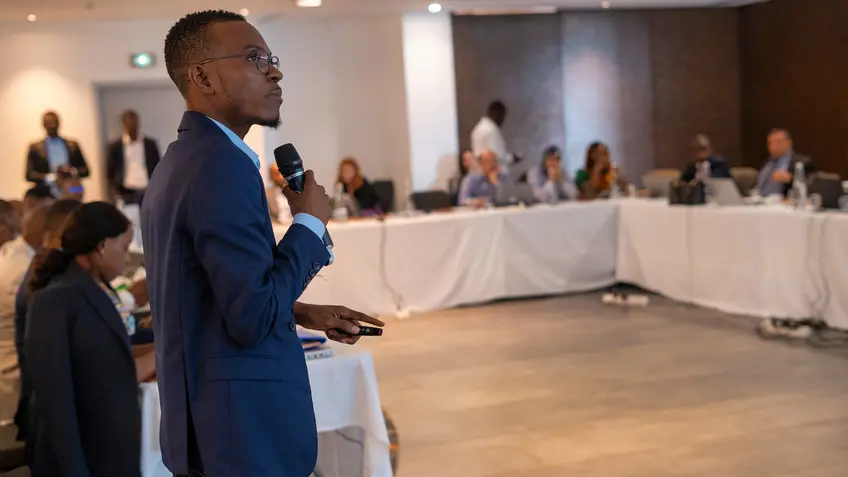Empowering Francophone Africa for Climate Adaptation Finance
Francophone Africa faces severe climate vulnerabilities, including extreme weather events like droughts and floods, which threaten agriculture, water resources, infrastructure and livelihoods. Despite the urgency, the region receives significantly less climate finance than other areas.
Climate vulnerabilities are exacerbated by insufficient financial flows to the region. In 2021-2022, Africa received USD 50 billion in climate finance, compared to the USD 607 billion directed to Asia. This underscores the need to rapidly increase funding to address specific adaptation needs in the region.
However, climate adaptation projects are inherently complex. Unlike mitigation projects, which often have clear economic returns, adaptation efforts require thorough understanding and quantification of local impacts, making them more difficult to finance.
The inception workshop of the "Regional Capacity Building Program on Climate Finance for Adaptation in North and Sub-Saharan Francophone Africa" organized by the NDC Partnership in collaboration with Climate Action Africa (CAA) in Abidjan, Cote d’Ivoire, aimed to address these challenges.
Addressing the Urgent Need for Climate Adaptation Finance
At the three-day workshop, experts and practitioners evaluated hurdles to securing climate adaptation finance facing Francophone African countries. "Climate finance is not just a necessity. It's a critical lifeline for the most vulnerable communities," explained Sangare Fatoumata from Guinea.
This workshop, led by Climate Analytics, is part of a series of six regional capacity-building training sessions on climate adaptation finance, specifically tailored for experts from line ministries in Francophone African countries. Spanning six months, the program offers participants a unique opportunity to enhance and develop their skills while adopting programmatic approaches that create conditions to mobilize the funding needed to implement their adaptation priorities.
This comprehensive training series equips participants to navigate the complexities of adaptation financing, supporting their countries in effectively addressing climate challenges. Experts from the Green Climate Fund (GCF), Adaptation Fund (AF), the Global Environment Facility (GEF) and other key organizations are expected to provide expert insight.
Overcoming Barriers: Insights from Regional Experts
Key takeaways from group discussions are as follows:
- The complexities of public budget planning and stringent procedures for project accreditation and submission complicate access to funds.
- Africa predominantly seeks grants over loans due to governance issues and inadequate planning within National Adaptation Plans (NAPs). This preference for grants reflects the need to avoid increasing the debt burden on vulnerable countries.
- The lack of clear quantification of adaptation needs and the complexity of submission mechanisms hinders the ability to secure necessary financing.
- The unavailability of scientific climate data and the absence of international entities dedicated to adaptation contribute to a general focus on mitigation over adaptation.
- The absence of private sector participation and non-operational institutions, respectively, points to the need for better incentives and a redefinition of priorities and debt issues.
- Most international funds operate primarily in English, creating a significant hurdle for Francophone countries. There is a clear need for translation services and bilingual technical support to facilitate access to these funds.
Strategic Actions for Enhanced Climate Finance
To address these challenges and enhance climate adaptation finance in Francophone Africa, a number of strategic actions are necessary:
- Capacity building: Strengthen local technical skills to design and manage adaptation projects through targeted training and knowledge-sharing initiatives that empower stakeholders and communities.
- Improving governance: Enhance transparency and stakeholder engagement in climate governance by establishing strong institutional frameworks and clear policies.
- Access to data: Invest in climate data collection and management to support informed planning and decision-making. Reliable data helps in assessing vulnerabilities and planning appropriate adaptation measures.
- Diversifying financing: Encourage private sector engagement through fiscal and regulatory incentives. Creating conditions that encourage private investments and public-private partnerships is vital to increasing funding.
- Simplifying procedures: Make project submission mechanisms more accessible and less complex to increase the uptake of climate funds. Streamlining application processes and providing technical assistance can help countries in accessing international funds.
- Addressing language barriers: Provide translation services and bilingual technical support to help Francophone countries navigate international climate fund applications and requirements.
Looking Forward: Building Resilience and Collaboration
By addressing the unique challenges faced by the region and implementing strategic actions, it is possible to mobilize the necessary resources to ensure sustainable development and enhance climate resilience.
Collaboration among governments, international partners and communities will be vital as we progress. The NDC Partnership will continue to play a crucial role in facilitating these efforts, supporting capacity building and ensuring that the climate finance needs of Francophone African countries are met.
"Climate adaptation finance is a lifeline for our communities," emphasized workshop participant Komlan Edou from Togo. "By working together, we can secure a resilient future for Francophone Africa."
